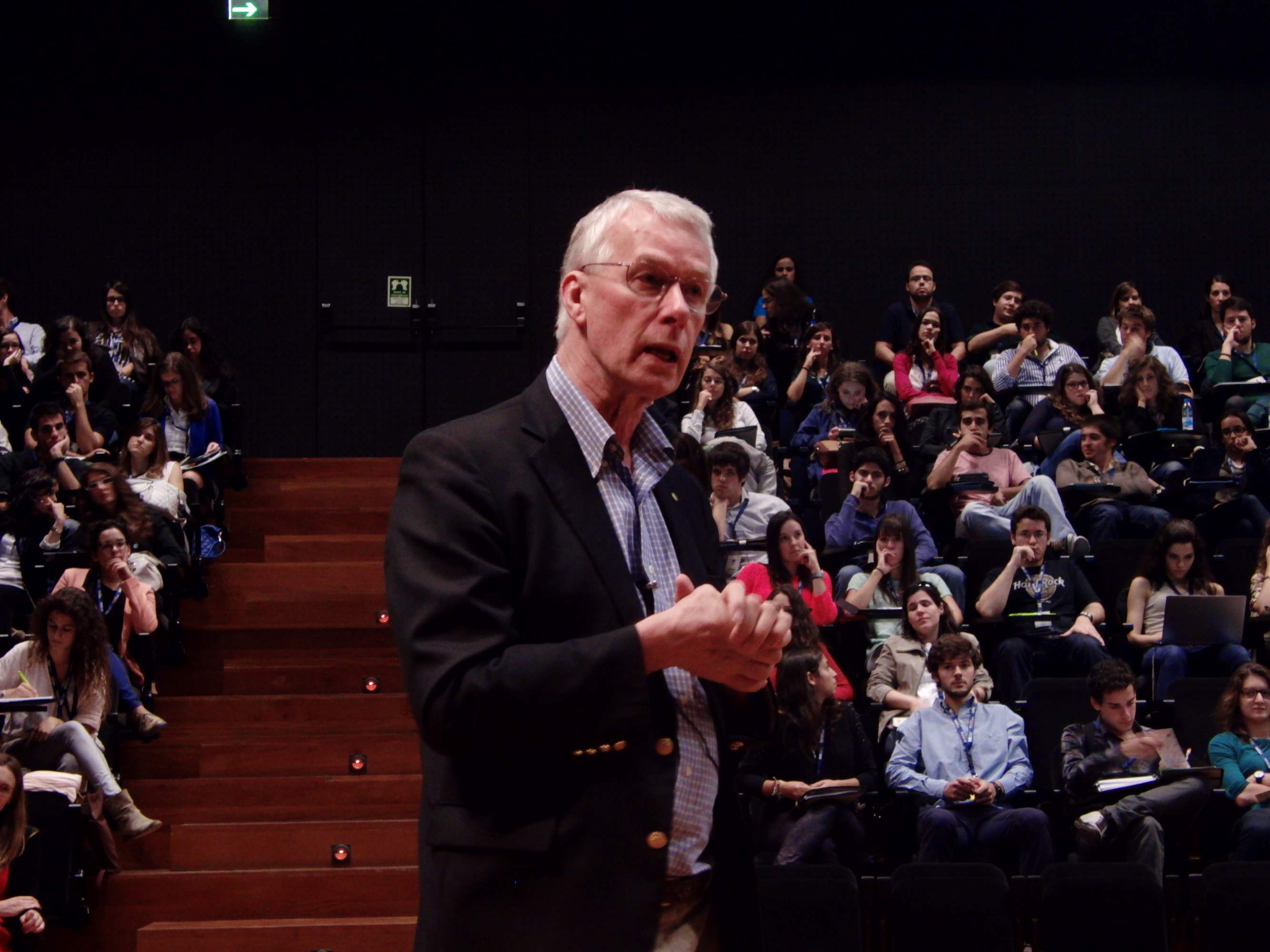
Dr. Richard J. Roberts is an enigmatic figure in the scientific world. His groundbreaking research and contributions to the field of molecular biology have earned him numerous accolades and awards, including the Nobel Prize in Physiology or Medicine in 1993.
But there is much more to Dr. Roberts than his scientific achievements. This article will delve into 19 intriguing facts about his life, career, and the impact he has made on the scientific community. From his humble beginnings to his pioneering work in gene splicing, each fact sheds light on the remarkable journey of this exceptional scientist.
So, buckle up and get ready to explore the world of Dr. Richard J. Roberts, a man whose curiosity, dedication, and passion have left an indelible mark on the field of molecular biology.
Key Takeaways:
- Dr. Richard J. Roberts’ research on gene splicing and restriction enzymes revolutionized molecular biology, leading to advancements in medicine, agriculture, and biotechnology.
- His dedication to ethical conduct, open access publishing, and science education inspires current and future scientists to make a positive impact on the world.
Nobel Prize Winning Scientist
Dr. Richard J. Roberts is a renowned British biochemist who was awarded the Nobel Prize in Physiology or Medicine in His groundbreaking research on gene splicing revolutionized the field of molecular biology.
Contributions to the Understanding of Genes
Dr. Roberts played a pivotal role in unraveling the mysteries of gene structure and function. His work led to the discovery of split genes, where certain segments are removed before the final genetic message is produced. This finding challenged the established notion that genes are continuous stretches of DNA.
Development of Restriction Enzymes
One of Dr. Roberts’ most significant contributions to molecular biology was his research on restriction enzymes. These enzymes act as molecular scissors, cutting DNA at specific points. This discovery paved the way for gene cloning and genetic engineering, allowing scientists to manipulate DNA for various purposes.
Early Life and Education
Richard J. Roberts was born on September 6, 1943, in Derbyshire, England. He developed a passion for science at an early age and went on to study chemistry at the University of Sheffield. After obtaining his bachelor’s degree, he pursued a Ph.D. in organic chemistry at the University of Bristol.
Transition to Molecular Biology
Although initially trained as an organic chemist, Dr. Roberts made a career-changing decision to delve into the emerging field of molecular biology. His interest in how genes function at a molecular level led him to join the Cold Spring Harbor Laboratory in New York.
Discovery of Introns
Dr. Roberts’ groundbreaking research led to the identification of introns, non-coding regions of DNA that are spliced out during gene expression. This discovery challenged the prevailing belief that genes are continuous stretches of genetic information.
Philanthropic Endeavors
Dr. Roberts is not only dedicated to scientific research but also to making a positive impact on society. He actively supports various philanthropic causes, including education, healthcare, and sustainable development.
Promotion of Open Access Publishing
A strong advocate for open access publishing, Dr. Roberts encourages researchers to freely share their scientific findings to facilitate collaboration and accelerate scientific progress. He believes that scientific knowledge should be accessible to all.
Scientific Entrepreneurship
Dr. Roberts co-founded New England Biolabs, a leading biotechnology company. The company specializes in producing and supplying reagents, enzymes, and other tools for molecular biology research.
Commitment to Science Education
Driven by a passion for inspiring the next generation of scientists, Dr. Roberts actively promotes science education. He supports initiatives that aim to engage young minds in scientific exploration and discovery.
Recognition and Awards
In addition to the Nobel Prize, Dr. Roberts has received numerous prestigious awards for his contributions to science, including the Royal Medal, the Louisa Gross Horwitz Prize, and the Albert Lasker Award for Basic Medical Research.
Publication and Research Impact
Dr. Roberts has authored or co-authored over 350 scientific publications, which have been cited thousands of times. His research has had a profound impact on the field of molecular biology and continues to inspire scientists worldwide.
Academic and Research Positions
Throughout his career, Dr. Roberts has held various academic and research positions, including serving as the Chief Scientific Officer of New England Biolabs and as a Visiting Fellow at Harvard University.
Continued Dedication to Scientific Research
Even after receiving numerous accolades, Dr. Roberts remains dedicated to pushing the boundaries of scientific knowledge. He continues to conduct research, explore new frontiers, and mentor aspiring scientists.
Global Impact of His Work
Dr. Roberts’ discoveries and contributions have had a profound impact not only in the scientific community but also in various fields such as medicine, agriculture, and biotechnology. His work has paved the way for advancements that benefit society as a whole.
Commitment to Ethical Conduct in Science
Dr. Roberts emphasizes the importance of ethical conduct in scientific research. He actively promotes integrity, transparency, and responsible practices in the pursuit of knowledge.
International Collaborations
Dr. Roberts has collaborated with scientists from around the world, fostering international cooperation and exchange of ideas. His collaborative efforts have led to significant advancements in the understanding of gene expression and genetic engineering.
Impact on Future Generations
Dr. Richard J. Roberts’ groundbreaking discoveries and contributions to molecular biology have left an indelible mark on the scientific community. His work continues to inspire and shape the future of scientific research and innovation.
Inspiring Role Model
With his achievements, passion for science, and dedication to making a difference in the world, Dr. Roberts serves as an inspiring role model for aspiring scientists and researchers worldwide.
Conclusion
In conclusion, Dr. Richard J. Roberts is truly an enigmatic figure in the field of science and research. From his groundbreaking work in molecular biology to his dedication towards advocating for open access publishing, he has left an indelible mark on the scientific community. Through his discovery of split genes and the development of recombinant DNA technology, Dr. Roberts has revolutionized our understanding of gene expression and genetic engineering.His relentless pursuit of knowledge and his commitment to making scientific research accessible to all have made him a respected figure in the scientific community. Dr. Roberts’ accomplishments have not only earned him numerous accolades and awards but also inspired countless researchers and scientists around the world.As we delve into the intriguing facts about Dr. Richard J. Roberts, we discover the man behind the scientific publications, a trailblazer who continues to shape the future of molecular biology. His passion for the field and his relentless pursuit of answers have undoubtedly made him a true pioneer in the world of science.
FAQs
Q: What are some of Dr. Richard J. Roberts’ major contributions to the field of molecular biology?
A: Dr. Richard J. Roberts discovered split genes, which revolutionized our understanding of gene expression. He also played a crucial role in the development of recombinant DNA technology.
Q: How has Dr. Roberts advocated for open access publishing?
A: Dr. Roberts has consistently voiced his support for open access publishing, arguing that scientific research should be readily available to the public without financial barriers. He has actively worked towards promoting open access and challenging the traditional subscription-based model of scientific publishing.
Q: What awards and recognition has Dr. Roberts received for his work?
A: Dr. Richard J. Roberts has been honored with numerous prestigious awards, including the Nobel Prize in Physiology or Medicine in 1993. He has also been elected to several scientific academies and has received honorary degrees from various universities.
Q: How has Dr. Roberts inspired future scientists and researchers?
A: Dr. Richard J. Roberts’ groundbreaking work and tireless dedication to scientific research have served as an inspiration to countless individuals pursuing careers in the field. His passion and commitment to advancing scientific knowledge have motivated aspiring scientists to push boundaries and make their own contributions to the field of molecular biology.
Q: What legacy does Dr. Roberts leave behind?
A: Dr. Richard J. Roberts will be remembered for his invaluable contributions to molecular biology and his advocacy for open access publishing. His discoveries and innovations continue to shape the field, and his commitment to making scientific research accessible will have a lasting impact on the scientific community as a whole.
Dr. Richard J. Roberts' groundbreaking work has paved the way for countless scientific advancements. His contributions to molecular biology have sparked curiosity about related fields, such as the intriguing world of genetic engineering. Roberts' Nobel Prize-winning research has also inspired interest in other renowned scientists, like Dr. Shinya Yamanaka, who made remarkable strides in stem cell research and was awarded the Nobel Prize in Physiology or Medicine. Moreover, Roberts' work has highlighted the importance of DNA sequencing, a crucial tool in modern genetics that continues to unravel the mysteries of life.
Was this page helpful?
Our commitment to delivering trustworthy and engaging content is at the heart of what we do. Each fact on our site is contributed by real users like you, bringing a wealth of diverse insights and information. To ensure the highest standards of accuracy and reliability, our dedicated editors meticulously review each submission. This process guarantees that the facts we share are not only fascinating but also credible. Trust in our commitment to quality and authenticity as you explore and learn with us.


